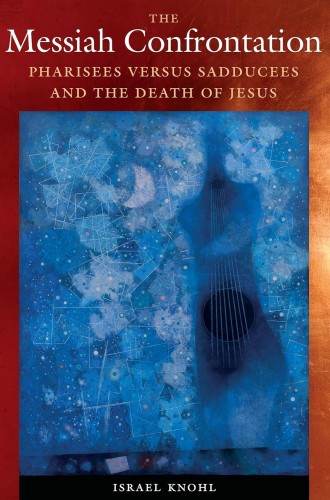The Pharisees didn’t kill Jesus
If they had been the ones presiding over Jesus’ trial, says biblical scholar Israel Knohl, there wouldn’t have been a crucifixion.

The Messiah Confrontation
Pharisees versus Sadducees and the Death of Jesus
In Mark 14, the scene is tense. Jesus stands before an assembly of the high priest, all the chief priests, the elders, and the scribes. False witnesses rise and tell tales meant to condemn Jesus, but their accounts don’t add up. So the high priest asks Jesus a pointed question: “Are you the Messiah, the Son of the Blessed One?” “I am,” Jesus says. At this, the high priest tears his clothes and accuses Jesus of blasphemy. The assembly agrees and condemns Jesus to death for it.
Interestingly, according to Israel Knohl, a leading Jewish biblical scholar, things could have gone differently. In The Messiah Confrontation, Knohl traces the complex story of the messianic idea in Jewish thought leading up to Jesus’ death. The story concludes with Jesus standing trial before a group of religious leaders who did not believe a (semi)divine messiah was coming to restore the Davidic kingdom. These were the Sadducees. Had it been the Pharisees presiding over Jesus’ trial, Knohl suggests, “Jesus would not have been condemned to death, convicted, and crucified.”
Read our latest issue or browse back issues.
The Pharisees, like most Jews in that period, hoped for the kingdom to be restored by a messiah who bore godlike qualities. The Pharisees may have disputed and rejected Jesus’ self-identification as the Messiah, but it would not have been considered blasphemy worthy of capital punishment. (The Pharisees would only have condemned someone to death for speaking God’s ineffable name.) For the Sadducees, however, Jesus’ claim to be the Son of the Blessed One was a grave offense.
The story Knohl tells begins in the world of scripture. The first seven chapters of his book explore tensions and developments related to the idea of messiah in the Hebrew Bible. Knohl shows, for example, how prophets like Isaiah and Jeremiah hope for a kingly messianic figure who will restore the kingdom of Israel, while Hosea proclaims a more antimonarchic message. Likewise, although the Torah maintains a clear and consistent distinction between God and human beings, certain psalms and prophets are willing to ascribe to kingly and messianic (anointed) figures godlike qualities. Knohl also explores the tension between the prophets Zechariah and Haggai, who imagine a high priest and a royal messianic leader working together, and Malachi, who appears to set aside messianic restoration in favor of the priestly rule.
The concept of messiah differs not only from one book to the next but also within individual writings. Isaiah, for instance, speaks of three messianic figures. In the first 39 chapters, the messiah is a future king who restores the kingdom of Israel; in chapters 40–55, Isaiah associates the messiah with King Cyrus; and in the final chapters, the messiah appears to be all of Israel.
These biblical tensions gave rise to various interpretations and competing religious factions. Knohl shows how the Pharisees and the community at Qumran emphasized the prophets and Psalms, holding out hope for a coming semidivine messiah. While the two groups’ ideas about the messiah were not identical, they were similar. Both imagined a strong, godlike, warring messiah. The Qumran community, however, had a small number of documents that depicted the messiah as suffering pain and mistreatment. Their messianic expectation, Knohl says, was generally representative of the Jewish people during the century before Jesus’ death.
As for the Sadducees, Knohl proposes that they took a minority position by adhering to the other side of the biblical tension. Because they privileged the Torah (perhaps taking only the Torah as authoritative scripture), the Sadducees followed the biblical traditions that dismissed messianic expectations, rejected the possibility of human beings having divine qualities, and preferred that priests rule over the people rather than kings. The high priest who presided over Jesus’ trial was a Sadducee. To him, when Jesus said he was the Messiah, the Son of the Blessed One, he spoke blasphemy of the highest order, blasphemy worthy of death.
Knohl acknowledges that our sources for knowing about the Sadducees are incredibly sparse. There are no extant writings composed by Sadducees, and the authors who discuss the Sadducees opposed them. Moreover, it appears that the general Jewish population was never beholden to them, raising questions about how this minority group could have single-handedly persuaded the crowd to turn on Jesus without the cooperation of the Pharisees, who were more numerous and accessible to the people. In other words, Knohl makes his argument reasonably and compellingly, but it rests on a great deal of speculation. But sometimes speculation is necessary to push a conversation forward.
And Knohl seeks to push forward a deeply significant conversation. “It is a great distortion of history to place the blame for Jesus’s crucifixion on the Jewish people as a whole,” Knohl explains. “Jesus’s judges belonged to a small antimessianic group, the Sadducees, which one generation after Jesus disappeared from history.” Knohl draws all of these loose threads together into an argument to dispel the notion that the Jews, in general, instigated Jesus’ death. Moreover, Knohl reiterates that it is not right to say that Jesus’ trial was a “clash of Jewish and Christian doctrines.” Instead, it was “a confrontation between two internal Jewish positions . . . in which Jesus and the Pharisees were on the same side.” Knohl hopes these clarifications will clear the way for new discourses and healing between Jews and Christians. I hope the same.
Christians remember Jesus’ crucifixion, death, and resurrection every Sunday. Knohl invites us to hear that story in the context of 750 years of debate between Jews about whether a messiah was coming and, if so, what that messiah would be like.





